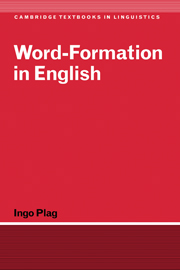Book contents
- Frontmatter
- Contents
- Preface
- Abbreviations and notational conventions
- Introduction
- 1 Basic concepts
- 2 Studying complex words
- 3 Productivity and the mental lexicon
- 4 Affixation
- 5 Derivation without affixation
- 6 Compounding
- 7 Theoretical issues: modeling word-formation
- Answer key to exercises
- References
- Subject index
- Affix index
- Author index
1 - Basic concepts
- Frontmatter
- Contents
- Preface
- Abbreviations and notational conventions
- Introduction
- 1 Basic concepts
- 2 Studying complex words
- 3 Productivity and the mental lexicon
- 4 Affixation
- 5 Derivation without affixation
- 6 Compounding
- 7 Theoretical issues: modeling word-formation
- Answer key to exercises
- References
- Subject index
- Affix index
- Author index
Summary
Outline
This chapter introduces basic concepts needed for the study and description of morphologically complex words. Since this is a book about the particular branch of morphology called word-formation, we will first take a look at the notion of ‘word.’ We will then turn to a first analysis of the kinds of phenomena that fall into the domain of word-formation, before we finally discuss how word-formation can be distinguished from the other sub-branch of morphology, inflection.
What is a word?
It has been estimated that average speakers of a language know from 45,000 to 60,000 words. This means that we as speakers must have stored these words somewhere in our heads, our so-called mental lexicon. But what exactly is it that we have stored? What do we mean when we speak of ‘words’?
In non-technical everyday talk, we speak about ‘words’ without ever thinking that this could be a problematic notion. In this section we will see that, perhaps contra our first intuitive feeling, the ‘word’ as a linguistic unit deserves some attention, because it is not as straightforward as one might expect.
If you had to define what a word is, you might first think of the word as a unit in the writing system, the so-called orthographic word. You could say, for example, that a word is an uninterrupted string of letters which is preceded by a blank space and followed either by a blank space or a punctuation mark.
- Type
- Chapter
- Information
- Word-Formation in English , pp. 4 - 19Publisher: Cambridge University PressPrint publication year: 2003



